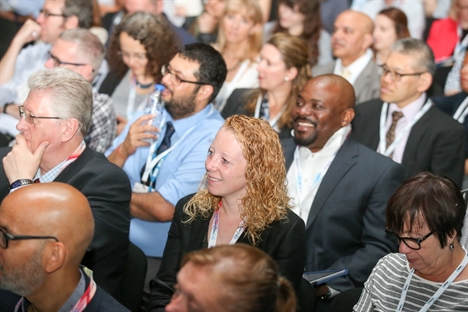16.08.17
Breaking down silos at Health+Care
Source: PSE Aug/Sep 17
PSE’s Luana Salles and Josh Mines report from this year’s Health+Care show, which served to highlight that isolated working is now a thing of the past.
The health and care landscape as we know it is radically changing. Rather than focusing on institutions, organisations are increasingly teaming up with others to design system-wide support targeted at whole populations. With sustainability and transformation partnerships (STPs) and accountable care systems beginning to take root, healthcare delivery will be much more geared towards geographical footprints that engulf multiple clinical commissioning groups (CCGs), trusts and local authorities. As such, providers and commissioners need to revolutionise their approach to outcomes-focused healthcare in order to thrive.
This year’s Health+Care show, situated once again at London’s ExCeL on 28-29 June, brought together thousands of health representatives to discuss just how this revolution will happen. As was the case last year, the event was co-located with the Commissioning Show, delivered in partnership with NHS Clinical Commissioners (NHSCC).
But while the Commissioning Show was chiefly focused on the work of CCGs, this did not mean debates on commissioners and their many interfaces with providers and councils were restricted to the Clinical Commissioning Theatre.
In his keynote speech during the first day of Health+Care, for example, Matthew Swindells, national director for operations and information at NHS England, told delegates that there is still a significant number of STPs “squabbling over last year’s invoices” and trying to decide whether the hospital or the CCG should foot the bill for a missed operation. Instead of working in silos, the NHS needs to “move away from protecting institutionalised interests and into protecting the needs of the public”, said Swindells.

“We have set the exam question for the best part of two decades as: how do you optimise your institution? And now we’re saying the exam question is: how do I optimise for my population, and how do I therefore park egos at the door and recognise each other’s problems in order to be able to solve the really hard problems that we can’t solve on our own?” he asked attendees.
In his address, Stephen Dorrell, chair of NHS Confederation, claimed that some STPs are standing out from the rest largely due to the pre-existing relationships on which they can build – both within the “traditional silos” of the NHS, such as the acute, community and primary sectors, but also between commissioners, providers and local government.
During the second day of the conference, Sir David Behan, chief executive of the Care Quality Commission, revealed that commissioning will also come to play a big role in his organisation’s inspections under its new five-year strategy. While the inspectorate only used to look at providers, it will use Section 48 powers from the Health and Social Care Act to assess the way commissioning operates across localities. This is part of a larger plan to move away from institutions-based regulation and towards more targeted, place-based inspections that consider how the whole system is working together.
In this same session, Wendy Thomson, managing director of Norfolk County Council and lead for the Norfolk and Waveney STP, said her local authority was doing much the same thing: putting an emphasis on the whole patient pathway.

“You don’t have to discharge someone from hospital if you didn’t admit them in the first place,” she said during the panel debate. “We should be looking at all the ways we can support people at home, in their community. We are working with our partners around promoting independence. There’s huge amounts in our community that can be supported to look after people at home before they answer the door of the hospital.”
But Dr Phil Moore, chair of the NHSCC Mental Health Commissioners Network and deputy chair (clinical) at Kingston CCG, challenged her definition of ‘patient journey’, arguing that patient care isn’t linear. “What happens is patients are looked after by a matrix of services at various times in their life journey, rather than passing from one to the other,” he pointed out. “We have to change our mentality in the way we approach this to much more of a matrix model than a journey model.”
Delegates at the show also heard from health minister Philip Dunne for the first time since his reappointment. While dodging any substantial announcements ahead of the chancellor’s Autumn Budget, he did confirm that the government remains focused on the four pillars of performance, financial sustainability, workforce and patient safety, and praised the health system for ending the last financial year in a much better economic position. However, Dunne did not forget to reiterate that the coming months and years will be challenging nonetheless, and touted STPs as the “best game in town” to deliver the kind of transformation needed to stay afloat.
The rest of the two days featured enthusiastic keynotes and debates from the likes of Lord Carter of Coles, NHS England mental health director Claire Murdoch and her predecessor Dr Geraldine Strathdee and NHS Providers boss Chris Hopson, amongst many other heavyweights.

At the Commissioning Show, the first day was opened with a keynote from NHSCC co-chair Dr Graham Jackson, who argued there will no longer be a single model of clinical commissioning going forward. Rather, all models will be locally-driven and regionally defined, demonstrating commissioners’ unique value in leading the specific communities they serve; CCGs will therefore become “hubs for strategic, whole-system and place-based commissioning”.
Dr Jackson’s keynote was followed by sessions whose wide-ranging themes served to prove just how indispensable CCGs will be to the changing landscape of the NHS. NHS England’s New Care Models programme director, Louise Watson, sat with STP and CCG leads to discuss how new services are seeking to transform community care; Jo Webster, Wakefield local STP lead, and Helen Hirst, Bradford District & Craven local STP lead, looked at how commissioners are responding to local needs across West Yorkshire and Harrogate; the two were then joined by the CCO of NHS Northumberland CCG, Dr Alastair Blair, to debate accountable care organisations; and James Sanderson, director of personalisation and choice at NHS England, closed the day off with a lively discussion on the importance of patient empowerment and responsive and flexible services.
The agenda for the show’s second day, which was kicked off by Dr Al Mulley from the prestigious Dartmouth Institute, was enriched with talks and panel sessions on the RightCare programme, which was recently celebrated as one of the major avenues through which STPs are tackling bed shortages; and the need to tackle inequalities across maternal and infant health.
Despite the event’s thematic splits, with its 13 theatres signposted for specific conversations, it was clear from the constant flow of delegates from one area of the show to the next – and the overlapping themes in each of the debates, regardless of whether they were chaired by providers, commissioners or councillors – that the imagined line demarcating artificial silos that exist in the NHS is now but a needle in a haystack. Health+Care has made it clear that, as we move towards uncharted territory and unfamiliar models of care, well, at least we’ll be doing it together.
FOR MORE INFORMATION
W: www.healthpluscare.co.uk